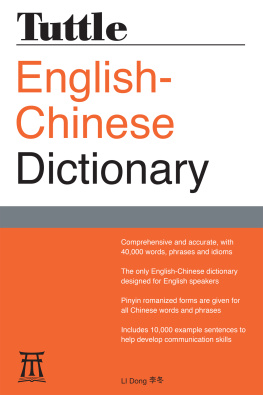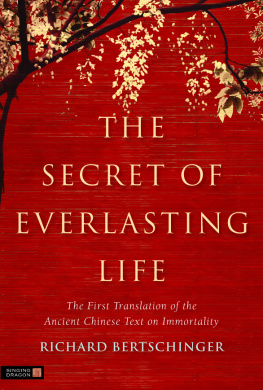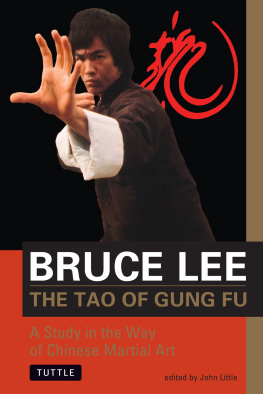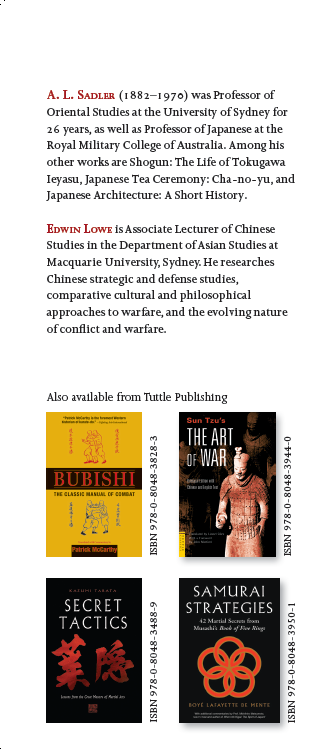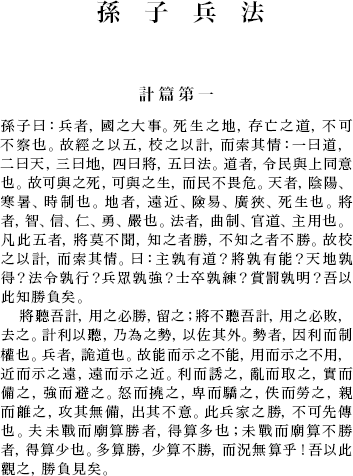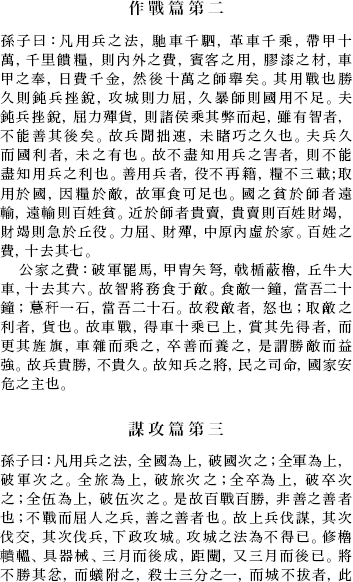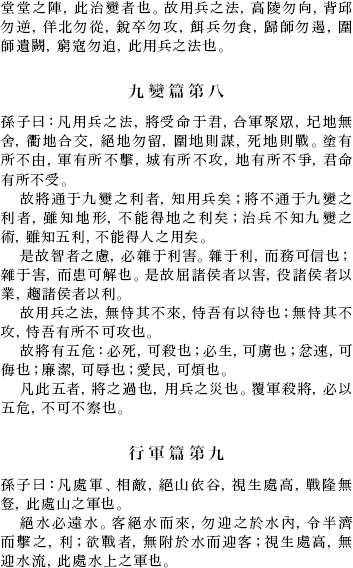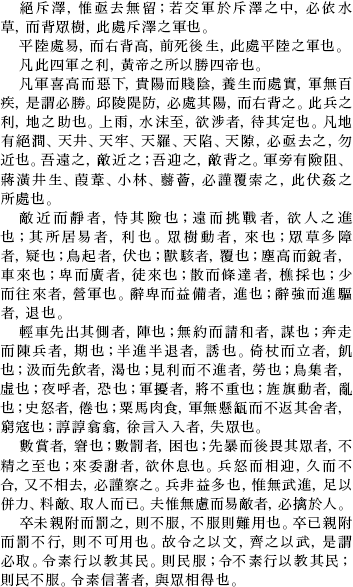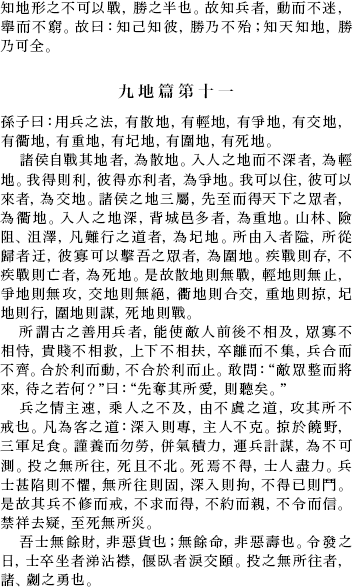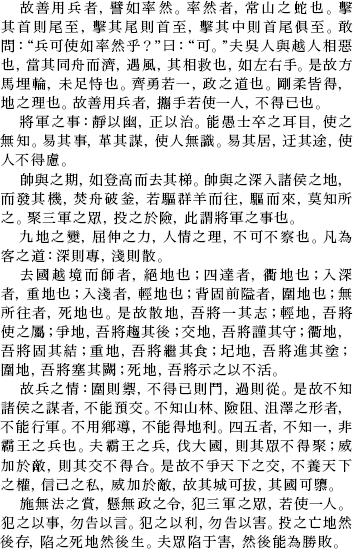The Art of War of Sun Tzu
(CHINESE TEXT)
The Art of War of Sun Tzu
Chapter IPlans
THE Master Sun said: Military affairs are of the greatest importance to a country, for life or death, survival or destruction depends on them. Therefore they must be carefully considered. And as a foundation for this there are Five Principles that have to be studied and their nature investigated. The first is the Way, the second Heaven, the third Earth, the fourth the Commander, and the fifth the Law. which general is the more able, which territory is the more advantageous, which army is the best disciplined, which soldiers are the stronger, and which side is the more just in reward and punishment. If we know these things we can determine the victor.
He who follows my plan will win and I will stay with him, but he who does not will lose and I will leave him. If he considers the advantages and takes my advice, I will put it into practice and assist him in action. But circumstances depend on advantage or the reverse, and must therefore be governed by expediency.
War is nothing but lies. And those who win in the calculation at Court before fighting are those who can calculate many things, while those who do not win in this calculation before fighting are those who can only calculate a few matters. Much calculation wins and little loses. How much more does none at all. So by contemplating these things you can tell who will win or lose.
Chapter IIOperations
The Master Sun said: To make war we need a thousand four-horsed war chariots, a thousand baggage wagons, and a hundred thousand armed men. And supplies must be sent to a distance. So that with the expenses at home and abroad, the entertainment of guests, the costs of glue and lacquer, the ser vicing of wagons and armor, it costs a thousand pieces of gold a day to keep an army of a hundred thousand in the field. And if it is so used that victory is long in coming, the soldiers become discouraged and their spirit is broken, while if they have to besiege a fortress their strength is impaired. And if the army is campaigning for a long time the resources of the country are insufficient. And if the soldiers are discouraged and their spirit is broken, their strength impaired and their substance exhausted, then the neighboring lords will take advantage of their deficiencies and attack them. And then, even though there are some who are wise, they will not be able to do any good. And while I have heard that a quick though clumsy campaign may pay, I have never seen any merit in a long one. There has never been any country that has benefited by a long war. So that he who does not realize the disadvantage of war will not be able to understand its advantages. And he who understands the use of soldiers will not conscript an army twice or raise supplies a third time. Gear should be obtained at home, but food supplies should be taken from the enemy and thus the army will have plenty to eat. The cause of the impoverishing of the country by the army is distant transport, for distant transport impoverishes the peasants. For in the neighborhood of an army prices are high and where commodities are dear the resources of the peasants are used up. And when his resources are used up he finds it difficult to till the public land. And with his strength depleted and his substance used up, the people in the provinces have empty houses and of the farmers contributions seven-tenths are consumed.
And of the state property also chariots are broken, horses are worn out, and of armor and helmets, bows and arrows, spears and shields, mantlets and towers, oxen and wagons six-tenths are lost. So that a clever general strives to feed on the enemy, for a measure of his food is worth twenty of ours and a stone of his fodder is worth twenty of our own. Destroying the enemy is encour aging to our men and taking his property is advantageous. So in a chariot fight those who first take more than ten of the enemys chariots should be rewarded. They should change the banners on these chariots and use them with their own, and the captured soldiers should be treated well. This is what is called overcoming the enemy and increasing ones own strength. For in war what is important is victory and not wasting time. So a general who understands war is the arbiter of the peoples destiny, the master of the safety of the State.
Chapter IIIThe Strategy of Attack
The Master Sun said: As to the way of making war it is better to take a country intact than to destroy it by fighting. It is better to take an army intact than to destroy it in battle. Better to take a battalion, a section, or a squad of men whole than to conquer them by fighting. So that winning every battle is not the highest attainment. The highest attainment is to subdue the enemy without fighting. The best plan is to strike at his strategy, the next to strike at his communications, next to strike at his armies, and the worst of all to strike at his strongholds. Besieging a stronghold is a last resort, because it takes three months to prepare mantlets, battering rams, and other siege machines and then another three months to build up the siege-towers. The general becomes angry at not conquering it and sends his men against it like ants, so that he loses a third of them and yet the place is not taken. Such are the drawbacks of a siege. So it is that the one who handles troops well is he who causes other peoples troops to surrender, but without fighting. He captures a strong hold, but without attacking it, and he takes other countries, but without a long campaign. He will always keep his resources intact while contending for the Empire and his soldiers weapons will not be damaged. Thus his advantage will be complete, and this is the principle of the strategy of attack.





